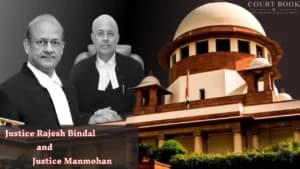In a significant ruling, the Supreme Court of India has clarified that physical presence is not mandatory in proceedings under the Domestic Violence Act (DV Act). The Court quashed an order directing the extradition of a US-based husband, emphasizing that such proceedings are quasi-criminal in nature and do not require the personal presence of the accused unless there is a breach of a protection order.
Background of the Case:
The case involved Vishal Shah (appellant) and Monalisha Gupta (respondent), who got married in February 2018. The couple moved to the United States shortly after their marriage, but their relationship deteriorated within a few months. The appellant alleged that he faced continuous domestic abuse from his wife, leading to their separation after just 80 days of cohabitation. The respondent, however, filed multiple legal cases against the appellant and his family members in India, including cases under Section 498A IPC (cruelty), Domestic Violence Act, and dowry-related charges.
As a result of these cases, the appellant's passport was impounded in October 2018, preventing him from returning to India. In one of the cases filed under the DV Act, the Judicial Magistrate in Howrah directed the authorities to initiate extradition proceedings against the appellant when he failed to appear in court. The Calcutta High Court upheld this order, prompting the appellant to approach the Supreme Court.
Read Also:- Supreme Court: Presence at Crime Scene Alone Does Not Prove Common Intention Under IPC Section 34
Supreme Court's Observations:
The Supreme Court, comprising Justices Pankaj Mithal and Sandeep Mehta, made several key observations:
No Need for Physical Presence in DV Act Proceedings: The Court noted that proceedings under the DV Act are quasi-criminal in nature and do not entail penal consequences unless there is a breach of a protection order. Therefore, there was no justification for requiring the appellant's physical presence in court.
"We may observe that as the proceedings under the DV Act are quasi-criminal in nature, thus, there cannot be any justification to require the personal presence of the appellant in these proceedings."
Extradition Order Unjustified: The Court held that the extradition order was untenable, especially since the appellant's inability to appear in court was due to the impoundment of his passport, a circumstance beyond his control.
"Consequently, the order of the learned JMFC directing the initiation of extradition proceedings against the appellant as a consequence of his non-appearance, despite being aware of the fact of impounding of the passport of the appellant, is untenable and unsustainable in the eyes of the law."
Passport Impoundment Illegal: The Court also ruled that the impoundment of the appellant's passport was illegal as it violated the principles of natural justice. The appellant was not given an opportunity to be heard before his passport was impounded.
"This clear violation of the principles of natural justice renders the act of impounding the passport ex-facie illegal."
The Court directed the authorities to release the appellant's passport within one week.
Read Also:- Supreme Court Woman Entitled to Maintenance from Second Husband Despite Legally Undissolved First Marriage
Irretrievable Breakdown of Marriage:
During the proceedings, the appellant filed an application seeking the dissolution of marriage on the grounds of irretrievable breakdown. The Court referred to previous judgments, including Shilpa Sailesh v. Varun Sreenivasan and Kiran Jyot Maini v. Anish Pramod Patel, to determine whether the marriage had broken down irretrievably.
The Court considered several factors, including:
- The short duration of cohabitation (only 80 days).
- The multiple legal cases filed by both parties against each other.
- The unsuccessful mediation attempts to resolve the disputes.
The Court concluded that the marriage had irretrievably broken down and dissolved it under Article 142 of the Constitution, which allows the Court to pass any order necessary for doing complete justice.
"The aforesaid facts give us the impression that there was hardly any cordiality or meaningful marital relationship that flowed from the marriage between the parties. It is evident that the relationship between the parties appears to be strained from the beginning and has further soured over the years."
Alimony and Settlement: The Court also addressed the issue of alimony. The appellant offered to pay a lump sum amount to the respondent as permanent alimony. After considering the financial status of both parties, the Court directed the appellant to pay Rs. 25 lakhs as a one-time settlement.
"Taking into account the standard of living enjoyed by the respondent during the subsistence of the marriage, the prolonged period of separation, and the financial status of both the parties, an amount of Rs. 25 lakhs appears to be just, fair, and reasonable."
Case Name: VISHAL SHAH v. MONALISHA GUPTA & ORS., Arising out of SLP(Crl.) No(s). 4297 of 2023














